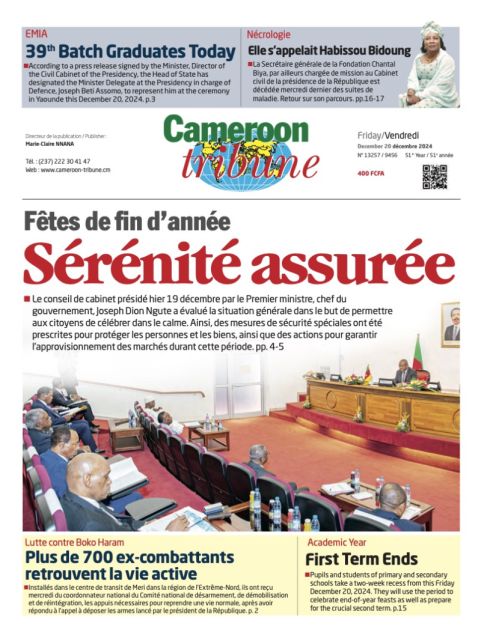Leadership has over the years been seen from different perspectives depending on the school of thought. But no matter the scenario, it is about combining efforts with existing forces to ensure better options for societies. In that light, traditional African societies have often struggled to meet up with modern trends while satisfying the demands of their local communities. In recent past and even today, it is a question of them coping with democratisation challenges, growing influence from a middle class elite and the national government polity that has the task to build national cohesion for the wellbeing of the nation.
Thus, guiding their people towards sound electoral choices in the midst of political plurality while maintaining harmony in their village settings has not been an easy exercise. Recent upheavals in the North West and South West Regions that added to the past experiences of multiparty politics in the country brought government to provide the two localities with House of Chiefs as a means of better reinforcing their ability to survive in an in moving sand. Traditional rulers in order areas have not been exempt either. They keep creating associations and looking for possibilities to get together so as to better formulate policies to cope with national aspirations and the needs of their people.
Historically, traditional powers are an emanation from man’s existence. Anthropologists may not gainsay the fact that the human being, everywhere on the planet, has always lived in the skin of culture, however primitive or civilized. This segment of authority draws its source from the shrines of gods and the person of the ruler, exercising spiritual and physical influence on the indigenes. The traditional institution advances through the generations by succession. The monarchies were rather known to be authoritative, strong, spiritual and physical even before the modern administration could set in. It was a special honour to come from a renowned powerful chiefdom or kingdom.
Meanwhile, the modern administration springs from Statehood and the republican ideology enhanced by design. It has the necessary arms of government to legislate, execute and judge. Above all, the modern administration possesses the people’s might to enforce its laws and bring order to the large State of more tribes and cultures.
Extensively, the State of Cameroon caters for the various traditional rulers according to their grades proffered through Presidential decree number 77/245 of 15 July, 1977, organising chieftaincy in the Republic. There are three categories and each chief must find his or herself in one of them. Non classified chiefs are not considered as such for any authority.
The First Class Chiefdoms are chart toppers with a clear definition based on their ruler ship over an area not exceeding an administrative division. Equally, they must have under their sphere of reign at least two Second Class chiefs. Granting the 13 September, 2013, Presidential decree fixing salaries for traditional rulers, the First class Chief is supposed to earn FCFA 200,000 monthly. The Second Class Chiefdom has at least two Third Class chiefs under their area of customary command not exceeding the territory of an administrative Subdivision. They should earn FCFA 100,000 monthly. The Third Class Chief earns FCFA 50,000 monthly and exercises traditional authority over his village of origin.
The Government or the public administration, in all circumstances, holds the reins of traditional leadership as the one to create, reclassify and rehabilitate the chiefs. This is a matter to say that the modern State is the hierarchical titular from whom all authority emanates. The State is the upstream and the traditional rulers are the downstream of national authority. Each one needs the other. And both work in harmony to administer the population and manage resources for the general interest.
Not Forsaken
Among the First Class Traditional Chiefdoms in Cameroon, the North West and South West can boast of 11. The top brass of traditional kingdoms in the English speaking part of the country are the emanation of 1977 State classification of chieftaincy in Cameroon and the First Class group has neither undergone any addition nor a subtraction.
Another major step by Government to sustain the traditional administration is the recent erection of two Houses of Chiefs in Bamenda and in Buea respectively for the North West and South West Regions. This happened during the recent decentralization drive oper...
Cet article complet est réservé aux abonnés
Déjà abonné ? Identifiez-vous >
Accédez en illimité à Cameroon Tribune Digital à partir de 26250 FCFA
Je M'abonne1 minute suffit pour vous abonner à Cameroon Tribune Digital !
- Votre numéro spécial cameroon-tribune en version numérique
- Des encarts
- Des appels d'offres exclusives
- D'avant-première (accès 24h avant la publication)
- Des éditions consultables sur tous supports (smartphone, tablettes, PC)













Commentaires